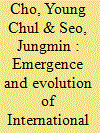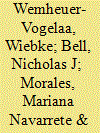| Srl | Item |
| 1 |
ID:
183219


|
|
|
|
|
| Summary/Abstract |
This study investigates how International Relations (IR) as an academic discipline emerged and evolved in South Korea, focusing on the country's peculiar colonial and postcolonial experiences. In the process, it examines why South Korean IR has been so state-centric and positivist (American-centric), while also disclosing the ways in which international history has shaped the current state of IR in South Korea, institutionally and intellectually. It is argued that IR intellectuals in South Korea have largely reflected the political arrangement of their time, rather than demonstrate academic independence or leadership for its government and/or civil society, as they have navigated difficult power structures in world politics. Related to this, it reveals South Korean IR's twisted postcoloniality, which is the absence – or weakness – of non-Western Japanese colonial legacies in its knowledge production/system, while its embracing the West/America as an ideal and better model of modernity for South Korea's security and development. It also reveals that South Korean IR's recent quest for building a Korean School of IR to overcome its Western dependency appears to be in operation within a colonial mentality towards mainstream American IR.
|
|
|
|
|
|
|
|
|
|
|
|
|
|
|
|
| 2 |
ID:
145117


|
|
|
|
|
| Summary/Abstract |
This article presents findings from the 2014 Teaching, Research, and International Policy (TRIP) Project’s worldwide faculty survey that speak to recent claims in the Global International Relations (IR) Debate. The expansion of the 2014 TRIP faculty survey to thirty-two countries, including more than a dozen non-Western IR communities, enables an initial empirical assessment of some key questions raised by advocates and detractors of “Global IR.” This contribution describes and analyzes scholars’ own perceptions of the IR discipline and adds to the empirical literature on the Global IR Debate. In particular, we address three claims: that IR is a Western/American dominated discipline, that geography is the core dividing line in IR, and that there is a division of labor within IR wherein scholars in the West are responsible for theory production while the non-West supplies data and local expertise for theory testing. We believe that these findings shed light both on how the discipline came to be divided between dominant and marginalized discourses and in which areas this division is most embedded and/or ready to be dismantled.
|
|
|
|
|
|
|
|
|
|
|
|
|
|
|
|